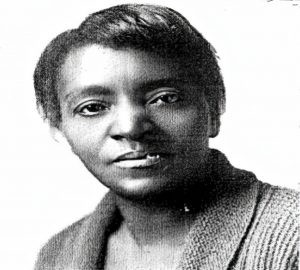
Photo info …
Credit: Indianapolis Public LibraryView Source
(Mar. 7, 1875-Aug. 9, 1943). Hethe “Hettie” Helen Johnson was born in Bowling Green, Kentucky, to Major and Anna (Jones) Johnson. The Johnsons lived in Terre Haute, Indiana, from 1880 to 1893. Here, Hettie Johnson married John Reeves, with whom she had two daughters. She and her husband moved to Danville, Illinois, at some point. In 1898, after leaving her husband, Hettie Reeves moved to Indianapolis, where she married Robert L. Brewer on June 15, 1908.
Hettie Brewer demonstrated leadership skills from the time she arrived in Indianapolis. She served as treasurer and later vice president of the West End Utility Club in Indianapolis beginning in 1912. She became club president in February 1913.
On March 30, 1913, in the wake of the Great Flood of 1913, a group of concerned community members on the west side of Indianapolis met at the to organize relief services for those in need. The community selected Brewer as a codirector of the effort.
Later, the West End Utility Club chose Brewer to represent the organization at the National Association of Colored Women’s Clubs (NACWC) convention at Wilberforce, Ohio, in August 1914. The club chose Brewer as a delegate to the in May 1915. She served as a delegate to the NACWC meeting held in Anderson Indiana in June 1916.
Brewer tried her hand at business, opening Brewer’s Café from 1915 to 1916 at 422 Indiana Avenue. With the closure of the café, she opened a restaurant in her home at 417 West St. Clair Street in December 1916. This endeavor ended within a few years.
On January 2, 1922, Brewer joined the , where she worked in new division of policewomen. This division, though under Burnside’s supervision, still reported to the chief of police. Brewer’s initial assignment involved patrolling the African American districts of Indianapolis.
In January 1923, Brewer’s troubles in the police department started. Chief of Police Herman Rikhoff assigned three policewomen, including Brewer to inspect the sanitary conditions of boarding houses and collect fines for the clerk’s office, among other tasks. Throughout the year, Brewer shifted from one assignment to another within the department. In early December 1923, Rikhoff filed a complaint against Brewer for neglect of duty on two occasions and for repeated improper filing of reports. In late December 1923, a court dismissed the initial charge but did find Brewer guilty of the second charge.
By the start of 1924, Brewer complained to Mayor that her assignment at City Hospital (now known as ) represented one of “the rotten jobs.” The mayor ordered Chief Rikhoff to assign Brewer to work for the traffic captain in the review of licenses and certificates of vehicles parked in downtown Indianapolis. Within a week at this job, Brewer was again reassigned as an inspector. She received training on housing and sanitation laws for her new assignment in the Shank-organized Housing Bureau.
In yet another shift, in March 1924, Clara Burnside recommended Brewer as a dance hall matron at the African American dance hall venues. She and partner patrolled the dance halls for moral infractions on Saturday evenings.
In 1926, Chief Claude F. Johnson led an investigation into charges that Brewer was operating an alcohol stand at the . Known as a “blind tiger,” selling alcohol during was a crime. Brewer resigned under the initial charges and further allegations that she and a fellow policeman frequented places where alcohol was sold on September 8, 1926.
Though her career as a policewoman was fraught with turmoil, Brewer remains noteworthy for being one of the first Black female police officers to integrate the Indianapolis Police Department.

Help improve this entry
Contribute information, offer corrections, suggest images.
You can also recommend new entries related to this topic.

